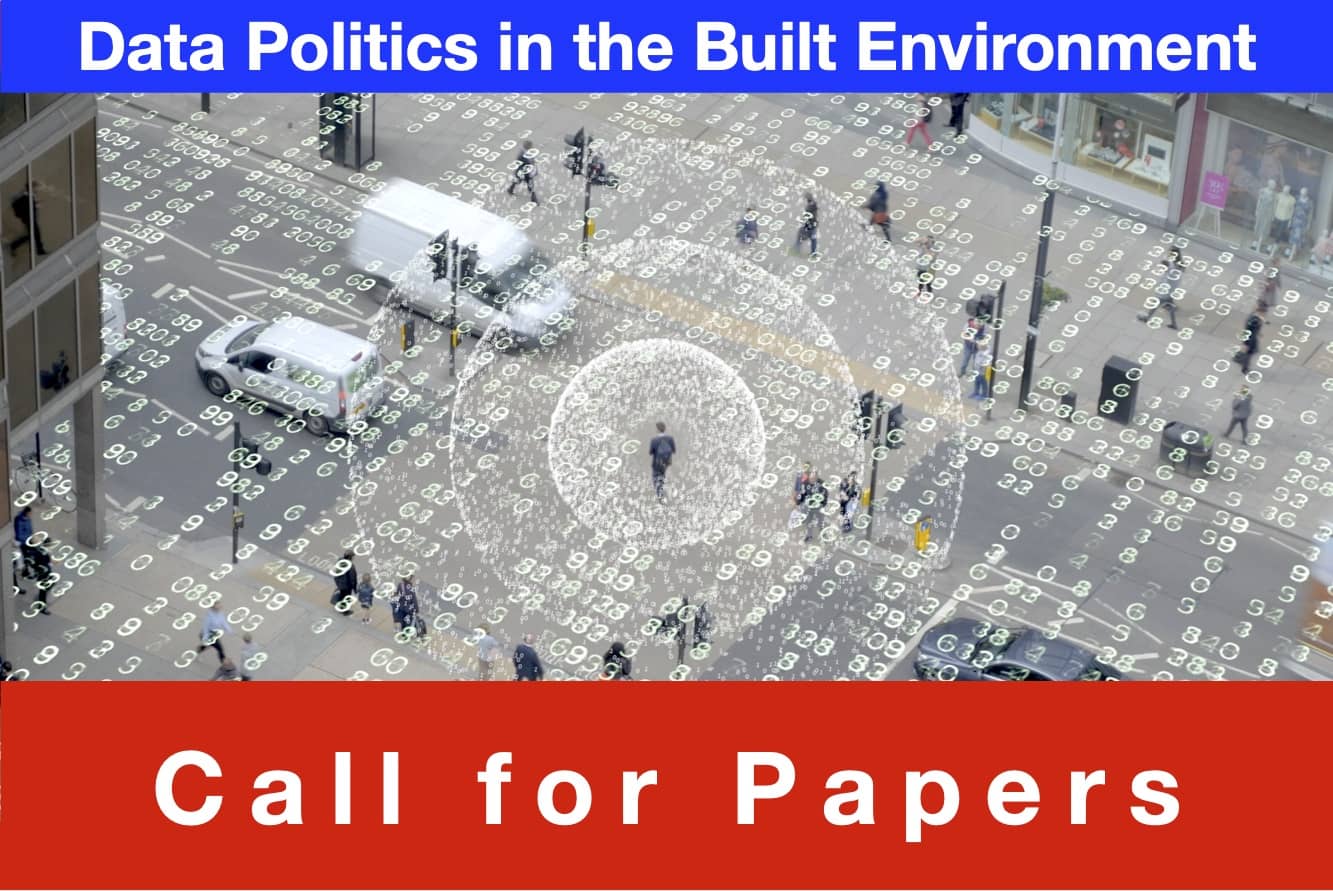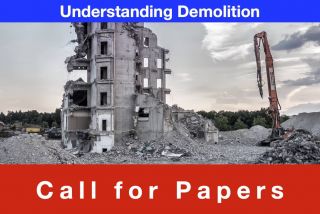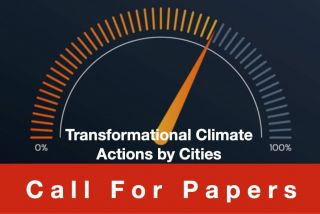
www.buildingsandcities.org/calls-for-papers/data-politics.html
Data Politics in the Built Environment

Guest Editors: Andrew Karvonen (Lund U) & Tom Hargreaves (U of East Anglia)
Abstract submissions closed on 26 September 2022
How are data reconfiguring life in buildings and cities? Who are the subjects and objects of data-driven buildings and cities? What are the implications of data-driven buildings and cities for social equity and justice? How do these powers and associated practices align with policies and regulation?
The aim of this special issue is to improve our collective understanding of the practices, politics, and power implications of data-driven buildings and cities. How is data generated, metabolised, and gathered in the built environment? Who designs and governs these data flows and to what end? Who and what is enrolled in the datafication of buildings and cities? What forms and types of data are collected and what gets ignored in data flows at and across different scales? What are the broader implications for social justice and equity? We invite social scientists, planners, designers, building scientists, data scientists, and environmental scientists to shine a critical spotlight on the motivations, methods, and consequences of data-driven buildings and cities.
Background
Buildings and cities are increasingly being reconfigured and reimagined by flows of data (e.g. Barns 2019, Hodson et al. 2020, Kitchin et al. 2017). Smart homes and connected buildings, electric scooter and bike sharing programmes, autonomous vehicles and Mobility as a Service programmes, surveillance and security systems, digitally-networked infrastructure services, and urban control centres are just a few of the many examples of how data cut across multiple scales to reconfigure buildings, neighbourhoods, cities, and regions in fundamental ways (e.g. Degen et al. 2022, Marvin et al. 2015, Luque-Ayala & Marvin 2020). This datafication of buildings and cities is intended to produce a seamless built environment that connects providers and users, facilitates information provision and financial transactions, and informs and improves decision making processes (e.g. Hodson et al. 2020).
There are growing concerns however that these processes of datafying the built environment are far from neutral and benign. Critics of data-driven environments argue that the collection, management, integration, analysis, and application of datasets produces specific lived conditions that are beneficial to some but not all (e.g. Bigo et al. 2020, Graham & Dittus 2022). This work has focussed on the unavoidably political processes involved in deciding what data gets collected (and what ignored) and how this generates particular and partial understandings that reflect and privilege some experiences of life in buildings and cities while neglecting others. For example, it has emphasised: how the presumed objectivity of data and the forms of algorithmic decision-making performed upon them can both mask and reinforce historic forms of prejudice, inequality and discrimination (e.g. Eubanks 2018); how data from 'smart' systems is used to surveil and control people in their homes, workplaces and local communities (e.g. Nicholls et al. 2020); how the opacity of data flows in cities serves to protect private interests whilst shutting out vital forms of public engagement (e.g. Sadowski 2020); and, more optimistically, how citizens and grassroots initiatives can both resist and innovate with and repurpose data flows to redistribute costs and benefits and generate more inclusive forms of smart urbanism. Taken together, these critiques not only raise important questions about social equity and justice in the datafication of the built environment, but also hold significant implications for how data flows in the built environment might be re-thought and re-made for more sustainable and inclusive ends.
List of suggested topics
We welcome theoretical and empirical abstracts that focus on the practices, politics and power implications of: smart homes, buildings and infrastructure networks, urban platforms and operating systems, e-governance and the digitalisation of public administration, city information modelling and digital twins, etc. The following questions provide some critical entry points for analysis and reflection:
- How are practices of algorithms, machine learning, artificial intelligence and calculative rationalities being applied to the built environment?
- Why are some types of data preferred over others in datafied buildings and cities and with what implications?
- How do data flows interact with and impact on everyday social interactions and dynamics in homes, workplaces and communities?
- How do the ontological and epistemological assumptions of data experts influence the knowledge differentials of urban development?
- Who gathers, cleans, analyses and applies data streams in cities and to what ends?
- How does the ownership of and access to data relate to consent, privacy, and security of urban residents?
- What types of surveillance landscapes are produced by data-driven agendas and what are the implications to privacy and control?
- How do data-driven agendas stretch, circumvent and contradict existing social dynamics, regulations, and policies?
- How are data flows implicated in the convergence of smart and sustainable urban development programmes and projects?
- In what ways are different publics engaged with and produced by data flows in the built environment?
- How are activists and civil society groups using data flows to support and extend their subaltern agendas?
- What are the implications for social equity and justice in datafied buildings and cities?
- Do data flows reconfigure the conventional scalar dynamics of buildings, neighbourhoods, cities, and regions?
- How are data flows creating new connections to transnational corporations and global knowledge networks?
Briefing note for contributors
You are invited to submit an abstract for this special issue. Please send a 500 word (maximum) abstract to editor Richard Lorch by 26 September 2022. Your submission must include these 3 items:
- the author's and all co-author's names, institutional and departmental affiliations, and contact details
- the question(s) in this Call for Papers that the abstract and intended paper address
- the abstract (300 - 500 words maximum) defining the research question(s), scope, methods and results.
Abstracts will be reviewed by the editors to ensure a varied, yet integrated selection of papers around the topic. Authors of accepted abstracts will be invited to submit a full paper (6000-7500 words), which undergoes a double-blind review process.
Buildings & Cities is an international, open access, double-blind peer-reviewed research journal. Its focus is the interactions between buildings, neighbourhoods and cities by understanding their supporting social, economic and environmental systems. More information including its Aims & Scope, Key Principles and Editorial Board can be found here: www.buildingsandcities.org & published papers are found here: https://journal-buildingscities.org
Open access / Article Processing Charge
Buildings & Cities is an open access journal and has an article processing charge (APC) of £1200. If you do not have institutional support, please notify the editor when submitting your abstract. B&C endeavours to assist those without funding.
Questions?
If you have a
question, please contact:
Richard Lorch
Andrew
Karvonen
or Tom Hargreaves
Timeline
|
Abstracts due |
26 Sept 2022 |
|
|
Workshop with selected authors |
Oct/Nov 2022 |
|
|
Full papers due |
01 February 2023 |
(NB: authors can submit
sooner if they wish) |
|
Referees' comments |
24 April 2023 |
|
|
Final version due |
22 May 2023 |
|
|
Second reviews (if needed) |
June 2023 |
|
|
Publication |
September 2023 |
(NB: papers are published as soon as they are accepted) |
Key readings
Barns, Sarah. (2019). Platform Urbanism: Negotiating Platform Ecosystems in Connected Cities. Springer Nature.
Bigo, D., Isin, E. & Ruppert, E. (2020). Data Politics: Worlds, Subjects, Rights. Taylor & Francis.
Degen, M.M. & Rose. G. (2022). The New Urban Aesthetic: Digital Experiences of Urban Change. Bloomsbury Publishing.
Eubanks, V. (2018). Automating Inequality: How High-tech Tools Profile, Police, and Punish the Poor. St. Martin's Press.
Graham, M. & Dittus, M. (2022). Geographies of Digital Exclusion: Data and Inequality. Pluto Press.
Hodson, M., Kasmire, J., McMeekin, A., Stehlin, J.G. & Ward, K. eds. (2020). Urban Platforms and the Future City: Transformations in Infrastructure, Governance, Knowledge and Everyday Life. Routledge.
Kitchin, R., Lauriault, T.P. & McArdle, G. (2017). Data and the City. Routledge.
Luque-Ayala, A. & Marvin, S. (2020). Urban Operating Systems: Producing the Computational City. MIT Press.
Marvin, S., Luque-Ayala, A. & McFarlane, C. eds. (2015). Smart Urbanism: Utopian Vision or False Dawn? Routledge.
Mattern, S. (2021). A City is Not a Computer: Other Urban Intelligences. Princeton University Press.
Nicholls, L., Strengers, Y. & Sadowski, J. (2020). Social impacts and control in the smart home. Nature Energy, 5.
Sadowski, J. (2020). Too Smart: How Digital Capitalism is Extracting Data, Controlling Our Lives, and Taking Over the World. MIT Press
Shapiro, A. (2020). Design, Control, Predict: Logistical Governance in the Smart City. University of Minnesota Press.
Latest Peer-Reviewed Journal Content
Urban verticalisation: typologies of high-rise development in Santiago
D Moreno-Alba, C Marmolejo-Duarte, M Vicuña del Río & C Aguirre-Núñez
A public theatre as a living lab to create resilience
A Apostu & M Drăghici
Reconstruction in post-war Rome: transnational flows and national identity
J Jiang
Reframing disaster recovery through spatial justice: an integrated framework
M A Gasseloğlu & J E Gonçalves
Tracking energy signatures of British homes from 2020 to 2025
C Hanmer, J Few, F Hollick, S Elam & T Oreszczyn
Spatial (in)justice shaping the home as a space of work
D Milián Bernal, J Laitinen, H Shevchenko, O Ivanova, S Pelsmakers & E Nisonen
Working at home: tactics to reappropriate the home
D Milián Bernal, S Pelsmakers, E Nisonen & J Vanhatalo
Living labs and building testing labs: enabling climate change adaptation
J Hugo & M Farhadian
Energy sufficiency, space temperature and public policy
J Morley
Living labs: a systematic review of success parameters and outcomes
J M Müller
Towards a universal framework for heat pump monitoring at scale
J Crawley, L Domoney, A O’Donovan, J Wingfield, C Dinu, O Kinnane, P O’Sullivan
Living knowledge labs: creating community and inclusive nature-based solutions
J L Fernández-Pacheco Sáez, I Rasskin-Gutman, N Martín-Bermúdez, A Pérez-Del-Campo
A living lab approach to co-designing climate adaptation strategies
M K Barati & S Bankaru-Swamy
Mediation roles and ecologies within resilience-focused urban living labs
N Antaki, D Petrescu, M Schalk, E Brandao, D Calciu & V Marin
Negotiating expertise in Nepal’s post-earthquake disaster reconstruction
K Rankin, M Suji, B Pandey, J Baniya, D V Hirslund, B Limbu, N Rawal & S Shneiderman
Designing for pro-environmental behaviour change: the aspiration–reality gap
J Simpson & J Uttley
Lifetimes of demolished buildings in US and European cities
J Berglund-Brown, I Dobie, J Hewitt, C De Wolf & J Ochsendorf
Expanding the framework of urban living labs using grassroots methods
T Ahmed, I Delsante & L Migliavacca
Youth engagement in urban living labs: tools, methods and pedagogies
N Charalambous, C Panayi, C Mady, T Augustinčić & D Berc
Co-creating urban transformation: a stakeholder analysis for Germany’s heat transition
P Heger, C Bieber, M Hendawy & A Shooshtari
Placemaking living lab: creating resilient social and spatial infrastructures
M Dodd, N Madabhushi & R Lees
Church pipe organs: historical tuning records as indoor environmental evidence
B Bingley, A Knight & Y Xing
A framework for 1.5°C-aligned GHG budgets in architecture
G Betti, I Spaar, D Bachmann, A Jerosch-Herold, E Kühner, R Yang, K Avhad & S Sinning
Net zero retrofit of the building stock [editorial]
D Godoy-Shimizu & P Steadman
Co-learning in living labs: nurturing civic agency and resilience
A Belfield
The importance of multi-roles and code-switching in living labs
H Noller & A Tarik
Researchers’ shifting roles in living labs for knowledge co-production
C-C Dobre & G Faldi
Increasing civic resilience in urban living labs: city authorities’ roles
E Alatalo, M Laine & M Kyrönviita
Co-curation as civic practice in community engagement
Z Li, M Sunikka-Blank, R Purohit & F Samuel
Preserving buildings: emission reductions from circular economy strategies in Austria
N Alaux, V Kulmer, J Vogel & A Passer
Urban living labs: relationality between institutions and local circularity
P Palo, M Adelfio, J Lundin & E Brandão
Living labs: epistemic modelling, temporariness and land value
J Clossick, T Khonsari & U Steven
Co-creating interventions to prevent mosquito-borne disease transmission in hospitals
O Sloan Wood, E Lupenza, D M Agnello, J B Knudsen, M Msellem, K L Schiøler & F Saleh
Circularity at the neighbourhood scale: co-creative living lab lessons
J Honsa, A Versele, T Van de Kerckhove & C Piccardo
Positive energy districts and energy communities: how living labs create value
E Malakhatka, O Shafqat, A Sandoff & L Thuvander
Built environment governance and professionalism: the end of laissez-faire (again)
S Foxell
Co-creating justice in housing energy transitions through energy living labs
D Ricci, C Leiwakabessy, S van Wieringen, P de Koning & T Konstantinou
HVAC characterisation of existing Canadian buildings for decarbonisation retrofit identification
J Adebisi & J J McArthur
Simulation and the building performance gap [editorial]
M Donn
Developing criteria for effective building-sector commitments in nationally determined contributions
P Graham, K McFarlane & M Taheri
Join Our Community

The most important part of any journal is our people – readers, authors, reviewers, editorial board members and editors. You are cordially invited to join our community by joining our mailing list. We send out occasional emails about the journal – calls for papers, special issues, events and more.
We will not share your email with third parties. Read more



Latest Commentaries
COP30 Report
Matti Kuittinen (Aalto University) reflects on his experience of attending the 2025 UN Conference of the Parties in Belém, Brazil. The roadmaps and commitments failed to deliver the objectives of the 2025 Paris Agreement. However, 2 countries - Japan and Senegal - announced they are creating roadmaps to decarbonise their buildings. An international group of government ministers put housing on the agenda - specifying the need for reduced carbon and energy use along with affordability, quality and climate resilience.
Building-Related Research: New Context, New Challenges
Raymond J. Cole (University of British Columbia) reflects on the key challenges raised in the 34 commissioned essays for Buildings & Cities 5th anniversary. Not only are key research issues identified, but the consequences of changing contexts for conducting research and tailoring its influence on society are highlighted as key areas of action.